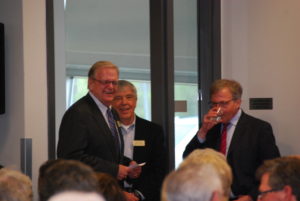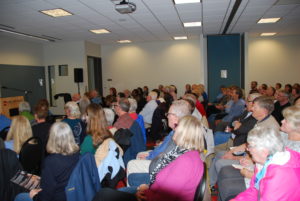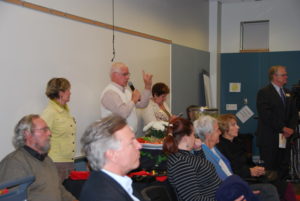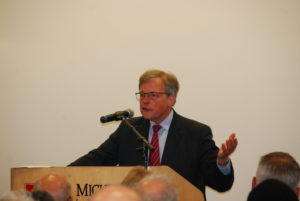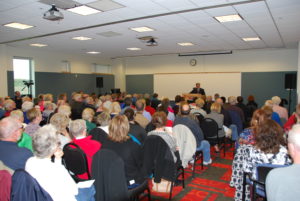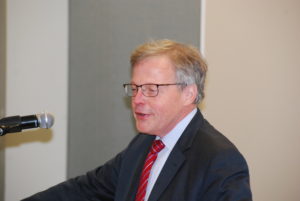By BECKY KARK
For the Herald-Palladium – http://heraldpalladium.mi.newsmemory.com/publink.php?shareid=1dd8cf55f
SOUTH HAVEN — It would be easy for Detroit- born journalist Jack Lessenberry to look back on the good ol’ days of the 1970s when he was a young adult and the Motor City fueled Michigan’s status as one of the top 10 states in America for economicactivity. But as Lessenberry and many other Michiganders know, those days are gone. “Now we’re 34th,” he told a group of 200 people who attended the South Haven Speaker Series on Thursday at Lake Michigan College’s South Haven campus.
It was Lessenberry’s task to talk for an hour about how to make Michigan better, and he was up for the challenge.
During a career that has spanned nearly 40 years, Lessenberry told the LMC audience that he has known every Michigan governor sinceG. Mennen “Soapy” Williams. Currently a commentator for Michigan Public Radio and head of journalism at Wayne State University, he used to work as a foreign correspondent and executive national editor at The Detroit News and wrote for national and regional publications, including Vanity Fair, Esquire, The New York Times, The Washington Post and The Boston Globe.
His career has taken him to 40 countries. “A number of those countries don’t exist anymore,” he quipped. But he’s always remained loyal to the Mitten State and Detroit.
Especially now when Michigan faces great challenges.
“Michigan is an absolutely wonderful state,” Lessenberry said. “In some ways we’re not the state we used to be. In 1979 GM had more blue collar workers in Flint then they do in the entire country today. … We could become the best economy in the country, but we have to work at it.”
He presented five issues that confront Michigan and possible solutions:
• Roads, bridges and infrastructure. “Every year our roads deteriorate further,” he said. “It’s very hard to attract new businesses when your roads look like Beirut after a shelling.”
But Lessenberry’s solution would probably trouble people – raise the gas tax 20 cents, maybe even 40 cents to pay for the $3 billion annual cost over the next decade to fix the state’s roads. Right now, the state Legislature is earmarking $1 billion annually for road upgrades.
• Public schools and higher education. “We are cheating our students, Lessenberry said. “We seem to be the first generation that doesn’t want it better for our kids.”
The problem mainly stems from fewer lowskill, high-paying factory jobs and an increase in low-paying service sector jobs. But Lessenberry said the state and federal government should contribute more money to colleges to reduce the tuition burden many students deal with.
State and federal government revenue once accounted for 70 percent of a college’s budget. Now tuition from students accounts for 70 percent of acollege’s budget. In regard to K-12 education, Lessenberry thinks the state shouldn’t fund charter schools and should focus on fixing problems at public schools. However, he is in favor of private schools.
“They don’t get taxpayer money,” he said.
• Gerrymandering. Redistricting political districts in Michigan has hurt Republicans and Democrats, Lessenberry said, pointing out that in 2014 people in Michigan voted for more Democrats than Republicans for the state House of Representatives, but Republicans ended up with a majority in the House – 64-47.
“It is impossible for Democrats to win a majority the way the lines are drawn,” he said.
• Term limits. “Term limits sound like a good idea, but it opens the system up for corruption,” Lessenberry said. “In the last two years of your term,who are you thinking more about, constituents or the lobbyist who will get you a job when your done?”
Most legislators are finally getting the hang of their job when they end up being term limited, Lessenberry said. “You know who understands their job? Lobbyists. They’re there forever.”
• Jobs. Michigan needs to generate more jobs for its citizens.
But it will take the combined effort of better roads, more affordable higher education, and a commitment by the state to help attract industries. Perhaps Michigan’s junior U.S. Senator, Gary Peters, has the solution – driverless cars.
“Driverless cars need a huge upsurge of AI (artificial intelligence),” Lessenberry said. “If you could headquarter that here in Detroit it could do for this state what automobile automation originally did.”


